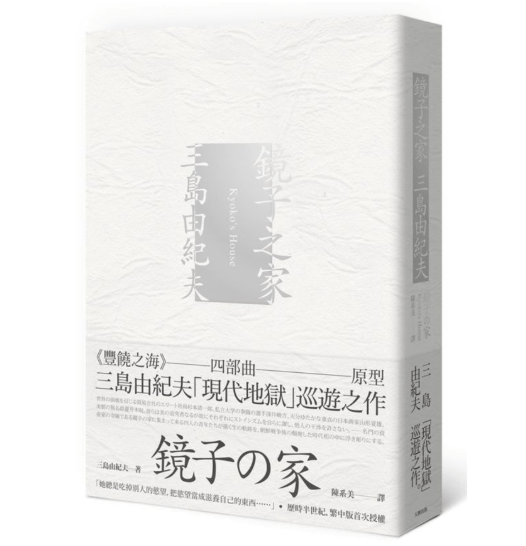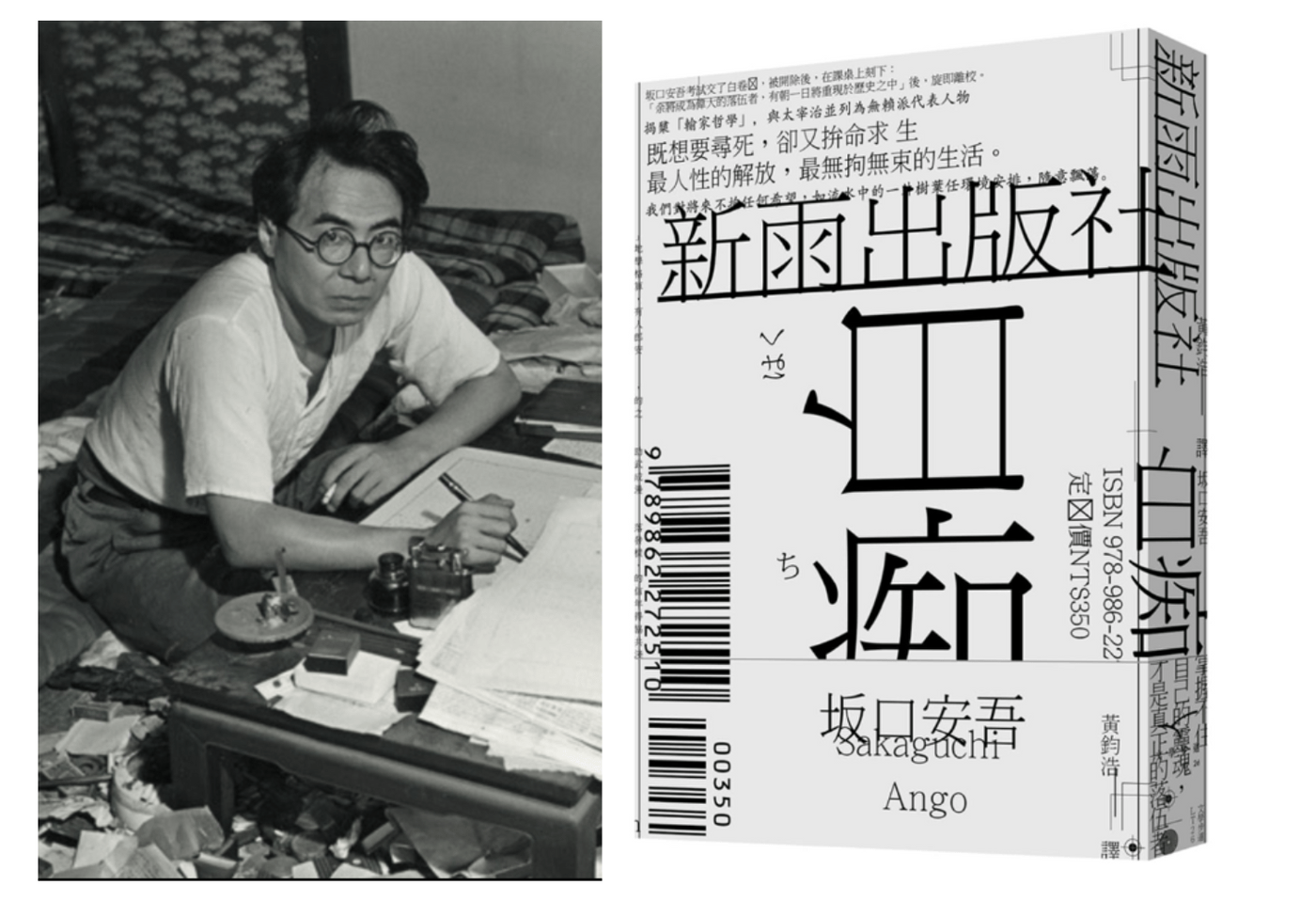Yukio Mishima's "House of Mirrors" book review: In the play of "distance", experience the loss and stitching of the self
Thanks to Weizhu Paratext for publishing this article
Link: http://paratext.hk/?p=2492
Born in 1925, Mishima Yukio, whose real name is Hiraoka Kowei. Leaving aside Yasunari Kawabata, it can be said that he is the second most important post-war Japanese literature. His handsome appearance, graceful and profound writing, and a legendary life made him not only a high reputation in China, but also has a lot of influence in the West. He even missed the Nobel Prize in Literature three times. Many people know that his name is because of "Kinkakuji" or "Confessions of a Mask", but according to what he said during his lifetime - at least before he wrote "The Sea of Plenty" - he thought that his favorite novel was not. The above two, but this "Mirror House" published in 1959. At the same time, although he is regarded as a giant of "postwar literature", Mishima doesn't seem to want to call himself this when he talks about this book.
"I described "individuals" in "Kinkakuji", and this "House of Mirrors" wants to describe "eras". The protagonists in "House of Mirrors" are not characters, but an era. This novel is not so-called postwar literature, but the literature of the 'postwar end'."

In the 1950s, Japan was exhausted because of World War II, but because of the outbreak of the Korean War and the economic assistance of the United States, the country's industries and people's livelihood became prosperous, and the economy not only stabilized, but also rose. However, Mishima emphasizes "end" between the words "postwar" and "literature", but it is because in his eyes, postwar Japan is not full of recovery and new life, but many things have been terminated and died.
"Living a life of poverty and oppression, and saying that as long as you live is happiness, this is the idea of a slave."
People become slaves to money, honor, ambition. What Mishima sees in people is the demise of the spirit in these booming times. Point out that the spirit becomes "just the shadow of the shadow." And sometimes, "love" becomes "marriage," a symbol of achievement and status in life. Seiichiro in the book has always believed that the world will be destroyed, not because he thinks the end of the world is coming, but because people's hearts have become empty in order to become slaves of life, unwilling to seek change, and unable to find the meaning of life.
This sentence is also reminiscent of Ango Sakaguchi's attack on morality in "On the Fall". He believes that the idea that Japan keeps encouraging people to stay calm, work hard, and strive to pursue "happiness" is wrong in order to get back on their feet, because the "happiness" people pursue is actually a prison of human nature full of repression and restraint. Instead, it encourages people to "degenerate" and "decadent." This does not mean that he thinks that depravity is a good thing, he just thinks that decadence is a necessary process of human growth. After being decadent, I realized what I lacked in my heart. If you only care about progress, but don't care about the emptiness of your heart and life, that is a truly depraved life.
"I only know that those who can't control their own soul are the real laggards." —— Sakaguchi Ango "Where to Go" (included in "Idiot")

Mishima, who wrote Lectures on Immoral Education and Anti-Virgin Girls University, also held similar views. But in "House of Mirrors", although it is also full of secular criticism, in addition to the criticism, what can be seen is more of Mishima's hesitation in the criticism. Because he seems to understand that no matter where people choose to go, they will actually face the same pain and loneliness.
"The House of Mirrors" describes the feelings and stories of five characters: boxer Junji, stage actor Ah Shou, painter Xia Xiong, office worker Seiichiro, and the last hostess, the mirror.
The stories of the five people actually do not overlap much in the text. In most of the pages, Mishima chooses to use a section-by-section approach to describe their respective events and their respective thoughts on the times and life. Only in a few passages do the characters meet unexpectedly and start a dialogue. Chief among them is the House of Mirrors in the title.
"Island and other things maintain a distance that cannot be filled, yet pretend to be close and within reach."
This "home" on the outskirts of Tokyo is a bit like an island. Five people who can't find the meaning of life here have no purpose to chat. Occasionally go out for a purposeless roaming. For the emptiness and loneliness of life, they did not intend to be relieved through each other. In fact, the Mirror likes these four young men precisely because they hate the monotonous, repetitive routine of their lives as much as they do. And reject the value that the world aspires to. It is believed that people are inherently alone, and we do not need to understand each other. As long as we observe each other with a certain curiosity and maintain a certain distance, we can learn how to live with nothingness through our own preferences and love.
You could say it's a bit of a "decadent" island. But this kind of thinking makes them feel free to communicate with each other. For them, what they want people to understand is not themselves, but the distance between themselves and others. And in the mutual teasing, toy with this "distance". The teasing may be through conversation, or through pretending (eg, pretending to be a couple), or sometimes sex. But what they have in common is that most of them do not directly express their true meaning, but use indirect hints and descriptions to make people guess their true intentions.
The interesting thing is that we can see from this that we are not just thinking about other people in our speculation. In fact, when we are thinking about others, we also find another self in our speculation. This kind of speculation then becomes not only a game with others, but also a game with myself. Through this game, the nothingness between oneself and others can be made less lonely.
The "distance" cannot be filled, but you can try to approach it or try to lengthen it. They learned a kind of entertainment: in the empty, empty mind, to constantly create "distance". Then, lose yourself in the play of these "distances".
"The woman's words turned into a mirror, phantoms of the muscles he had exercised in the darkness...(however) in the middle of the sex, his presence was blurred again. Dissolved, lost assurance, and then again lonely..."
Bataille believes in "Eroticism" that human eroticism is the part of consciousness that questions one's own life. This statement is quite suitable for Ash. In order to arouse one's own sense of existence, what is needed is not understanding, but another person who can serve as a "mirror". But this is where the "mirror" is most dangerous. He can make people observe their own longings, but can also illuminate their own emptiness.
In playing with multiple distances, a person may be able to feel that he is being felt in different ways. It seems to be an existence with many appearances and attitudes in life. But as time passed, they slowly couldn't struggle. Ah Shou committed suicide, Jun Ji and Xia Xiong originally thought that as long as they immersed themselves in their passions - boxing and painting - they could build a world of their own to escape the monotony of life. But when one of them won a boxing championship and the other made a big name for their work, they suddenly found out that they were never what they thought they were.

Junji, who thinks he is strong, finds that his yearning spirit (don't think, just act) is still just a competitive competition that is consumed in the market in the end. There is no spirit in it. Unpleasant fame and fortune. In the constant fighting, he did not turn into what he yearned for in the eyes of others. Instead, he was like a clown, and many people used his love for boxing to create fame and fortune. Or, become an empty idol in the eyes of others to comfort oneself. He had to feel that the belief in life he gave to boxing seemed naive. As for Xia Xiong, after he painted one of his most beautiful works, he lost his direction. Because in this world he can't seem to find a more beautiful picture than the scenery he saw when he painted this work. At the same time, more importantly, he couldn't find the scenery in his heart in a more beautiful picture.
Mirror and Seiichiro are a bit like the role of the reader, they listen to others, read the details of other people's words and actions, and revel in the analysis of other people's psychology and the imagination of other people's experiences. Nothing but the emptiness that can satisfy itself. Listening to others can make one's own poor past "filled" and unique. As if it were his own memory.
"Why is it so important to us to pay attention to others? Just as savages believe that by eating the flesh of a brave adversary, they can make their courage their own, so I also believe that eating other people's hopes can make them their own. Yes. Ah! Others are victims, irreplaceable real existences.”
However, Ah Shou's death, and Junji's subsequent serious injury by a hooligan, caused Seiichiro and Mirror to suffer a lot.
"It's dangerous to be too interested in other people. It will pull us to places we never thought about, and end up with 'other people's fate'."
Personally, I think here, Mishima confided a very low-level voice. Writing allows people to become various characters in writing and reading, enriching their limited experience. But in the end he has a cruelty: just as reading someone's story brings tears to our eyes, we feel the suffering and pain of the characters in the book. Despite the distance between them, they can still sense each other.
"House of Mirrors" is a work with an existential atmosphere. The nothingness that is constantly discussed in the book is the fragmentation that people constantly experience in their lives. And this fragmentation has always been deeply connected to our tendency to constantly find ourselves in others. From a certain point of view, Mishima told us that it is empty to find ourselves in ourselves. Only when we realize that all the people around us are a certain part of ourselves, can we truly recognize our diversity and accept our seemingly monotonous appearance. life.
(Original post on Blog: Literary Lab)
Medium: https://medium.com/@f0921918962
Square: https://vocus.cc/1111/home
Like my work? Don't forget to support and clap, let me know that you are with me on the road of creation. Keep this enthusiasm together!

- Author
- More